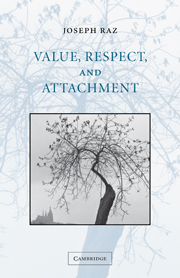3 - The value of staying alive
Published online by Cambridge University Press: 04 December 2009
Summary
Framing the question
To anticipate: I will endorse Epicurus' view that ‘death is nothing to us’, or rather a version of it. My reasons are not his, and do not depend on endorsing the view that only sensations are good or bad. Human life, I will argue, is not intrinsically and unconditionally valuable at all. The ancient doubts about people's life being good for them were many, and my argument will be no more than a variant on some of them. I will use it to argue for the view that life is a precondition of good, and normally a conditional good, but that it is not unconditionally and intrinsically good. I will call this the thesis.
The approach underlying the thesis can be described thus: people's life can be of value (or good, or valuable – I will use various expressions as designating roughly the same idea) or without value. It can also be bad with negative value only (as well as, of course, bad on balance, i.e. with good and bad, but with the bad predominating). The value of one's life is determined by the value of one's activities, relationships, and experiences, in short, by the value of its content. The value of continuing alive depends upon the value of the content of one's life if one were to remain alive longer. Alternatively, perhaps, it depends on what it is reasonable to expect the content of one's future life to be.
- Type
- Chapter
- Information
- Value, Respect, and Attachment , pp. 77 - 123Publisher: Cambridge University PressPrint publication year: 2001
- 1
- Cited by

